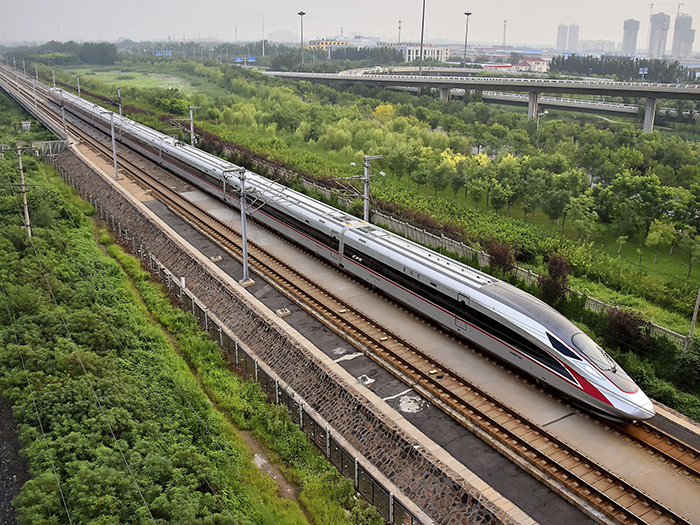



 Kevin Barrett
Kevin BarrettIn his recent Crescent article “Why the West hypes China’s Rise” Tahir Mahmoud argues that there is less to the popular image of Chinese ascendency than meets the eye. The author states that Chinese tourists’ predilection for taking US dollars rather than Yuan to Malaysia shows that China is still subjugated to the West. China’s love of the American dollar, he suggests, symbolizes its capitulation to the Western neoliberal capitalist global order. And the West, knowing that imitation is the sincerest form of flattery, is secretly happy with the very empowerment of China that it pretends to fear and resist.
There is a degree of truth in that analysis. The West obviously can’t decide whether China is a rising enemy or a kowtowing acolyte, or some combination thereof. And Tahir Mahmoud is also correct in his assertion that China has been weak and inept in the field of soft power. Beijing’s ham-fisted mistreatment of the Uyghur, and its failure to launch a global media project along the lines of Russia Today, PressTV, Telesur, al-Jazeera, and so on, are just two examples of major soft-power failings. As Mahmoud says, this failure partially results from China’s lack of any viable indigenous religious-ideological weltanschauung. Taoism, Confucianism, and Buddhism are rich traditions with deep Chinese roots; but these venerable (arguably prophetic) teachings have been uprooted and left to wither and die beneath the scorching sun of Western imperialist (post)modernity. China’s dominant religion today is watered-down Marxism, which coexists uneasily with the capitalist inroads opened by Deng Xiaoping. Belief and practice of the official religion of Marxism does not seem especially deep or wide in today’s China.
Although Tahir Mahmoud’s analysis is largely correct as far is it goes, he misses some important data points. The first and most obvious is that the Chinese leadership is playing a long game, while Western leaders only think ahead to the next quarter’s balance sheet. Yes, today’s Chinese tourists take dollars with them when they go abroad, but what about tomorrow? China’s economy will surpass the USA’s by around 2030. Meanwhile the US dollar is being gradually undermined by unsustainable debt and the creeping realization that the era of unipolar empire is over. So those dollars in the wallets of today’s Chinese tourists may be replaced by Yuan within a generation or so.
Second, China’s partial embrace of neoliberal capitalism does not immunize it against Western enmity. As René Girard convincingly argues, human beings fight because they are the same, not because they are different. It is imitation not difference that produces rivalry and violence. China’s imitation of some aspects of Western capitalism may flatter the West, but it won’t pacify it.
Third and most importantly, China’s economic and technological success stems less from blind imitation of decadent Western neoliberal hyper-individualism, but from an overlay of collectivism and morality imposed from above by the Communist party and the state apparatus it dominates and guides. A notable example of this collectivist morality is China’s fervent and interminable anti-corruption campaign. As the West’s greatest living philosopher-theologian John Cobb recently stated on my radio show (listen here) the Chinese are not only acculturated to despise corruption, but deem many common Western practices corrupt. Cobb’s examples include visiting Chinese academicians who refuse to engage in pleasurable or touristic activities while visiting a foreign city for a conference, because doing so would be “corrupt.” Western academicians and professionals, by contrast, regularly schedule conferences in touristic locations precisely so they can get their universities or corporations to pay for their vacations.
The most important domain in which China is less corrupt than the West is banking. Chinese banks are more than 80% state-owned. That means that critically important decisions associated with the creation and circulation of money are made not by a super-rich cabal of private financiers driven by self-interest, but by a technocratic elite whose primary ethos is national service. While the West courts casino-capitalist catastrophe by handing money-creation power to Zionist-dominated bankers who (for reasons of sheer greed) pump up quadrillion-dollar derivatives bubbles, China creates money by spending it into existence to create useful and productive infrastructure: high-speed rail, 5G, and an array of environmental sustainability projects that Cobb and Andre Vltchek discuss in their new book, China and Ecological Civilization.

What can Muslims learn from China’s example? The Qur’an urges us to travel through the earth and meditate on the rise and fall of past civilizations. And it suggests that civilizational collapses are rooted in morality! Declines and collapses of once-great civilizations are not only caused by Malthusian population explosions, soil exhaustion, and other ecological factors, as secular authors like Jared Diamond tell us. They also stem from moral declines. The world’s first and some say greatest social scientist, Ibn Khaldun, noted the importance of a certain kind of morale, what he called ‘asabiyah, in the civilizational cycle. Today the Chinese are outstripping the West because they are working diligently, avoiding corruption, sacrificing for the common good, and putting long-term collective well-being ahead of short-term individual interest.
But how long will the Chinese rise continue? One reason the West isn’t panicking about China is that after 2030 Chinese growth is projected to slow considerably due to what some call a looming “brutal demographic collapse.” As Mahmoud’s article suggests, China’s lack of a robust and sustainable religious-philosophical tradition could intensify that slowdown. Today’s China of anti-corruption campaigns and diligent sacrifices for the collective future could morph into tomorrow’s China of hedonism and short-sighted self-interest in the midst of demographic implosion.
We Muslims, unlike Chinese “Marxist capitalists,” have a religious tradition that offers convincing metaphysical reasons to avoid corruption and to sacrifice for the common good. And given our sacred “family values” we are unlikely to face demographic collapse any time soon. If we took our religious tradition seriously, Muslim countries and communities would be the least corrupt places on earth, and Muslims would be the most diligent and dependable people on earth. In such a world, Islamic civilization could easily outshine its competitors. Unfortunately, today’s Muslim Ummah does not demand enough of itself and its leaders. It is a sign of the times that our holy places are in the hands of nominal Muslims who could compete for the dubious distinction of “most corrupt people who ever lived.”
In conclusion, the Ummah can take some lessons from China. Specifically, we must achieve independence from Western imperialism-colonialism, as China did in 1948 (and Iran did in 1979); revive ethics and morality and sharply reduce corruption; end the putrid reign of private riba-based money creation and banking; and find ways to “rise peacefully” within the existing world system. An ascendant future Islamic civilization would have a sounder basis, and prove more resilient, than either today’s post-Confucian post-Marxist China or its primary opponent, the declining post-Christian postmodern West.
